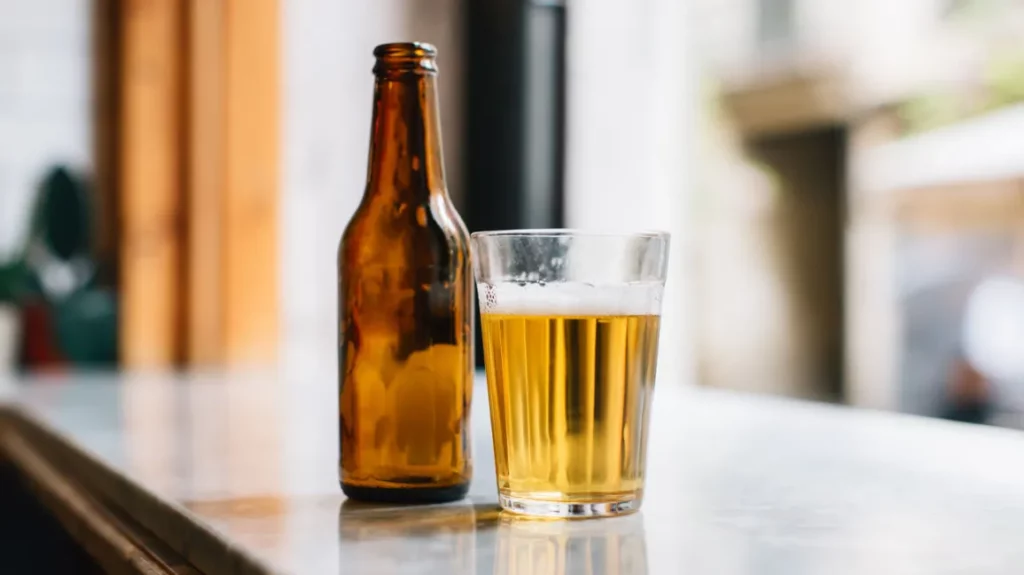Diabetics spend most of their day wondering what should they eat, what snacks are healthy for them, and much more, and for a good reason. If you’re living with diabetes, you might have wondered, “Can I still enjoy a drink?” It’s a common question, and you’re not alone in asking it. In this blog, we’re going to explore everything you need to know about alcohol and diabetes. We’ll look into whether it’s safe for diabetics to drink alcohol, how it affects your blood sugar, and what kinds of drinks are better choices. Plus, we’ll share some tips to keep you safe and healthy if you decide to enjoy a drink. So let’s dive in and discover how you can manage diabetes without missing out on life’s little pleasures.
Contents
Can Diabetics Drink Alcohol Safely?
 It’s a big question for anyone managing diabetes: “Can I drink alcohol safely?” The straightforward answer is yes, but with some important considerations. Drinking alcohol when you have diabetes requires careful consideration and planning to avoid potential risks to your health.
It’s a big question for anyone managing diabetes: “Can I drink alcohol safely?” The straightforward answer is yes, but with some important considerations. Drinking alcohol when you have diabetes requires careful consideration and planning to avoid potential risks to your health.
First things first, always talk to your doctor before making alcohol a part of your routine. They can give you personalized advice based on your health condition, medication, and blood sugar control.
Here are some key points to keep in mind if you choose to drink:
- Alcohol can impact your blood sugar levels in unpredictable ways. It can cause blood sugar to rise or drop, depending on how much you drink and if you’re eating food with it. Keeping a close eye on your levels is crucial.
- Never drink on an empty stomach
- Choose your drinks wisely, Light beer, dry wines, and spirits with calorie-free mixers are generally better choices.
- Know when to skip it to avoid complications related to diabetes.
In essence, while enjoying a drink now and then is possible when you have diabetes, it requires mindful management to ensure your health and safety. Moderation is key, along with keeping track of your blood sugar levels and understanding how alcohol interacts with your body and diabetes medication.
The Impact of Alcohol on Blood Sugar Levels
 It is no secret that alcohol consumption can lead to health problems. For diabetics, this is especially true. Alcohol’s impact on your body is a bit of a balancing act — it can cause your blood sugar levels to rise or fall, depending on various factors.
It is no secret that alcohol consumption can lead to health problems. For diabetics, this is especially true. Alcohol’s impact on your body is a bit of a balancing act — it can cause your blood sugar levels to rise or fall, depending on various factors.
Here’s what happens:
- Immediate Blood Sugar Rise: Initially, alcoholic drinks, especially those high in sugar like certain cocktails and sweet wines, can cause a quick spike in your blood sugar.
- Delayed Hypoglycemia: The more complicated part comes after this initial spike. Alcohol can interfere with your liver’s ability to release glucose into your bloodstream. This is especially important for those taking insulin or insulin-stimulating medications. Your liver normally acts to release stored glucose if your blood sugar drops, but alcohol blocks this process, increasing the risk of hypoglycemia (low blood sugar levels), sometimes hours after drinking.
- Interactions with Medications: Alcohol can also interact with diabetes medications, altering their effectiveness. For example, it can increase the risk of side effects like hypoglycemia or even hyperglycemia (high blood sugar levels) in some cases. It’s essential to know how your medications react with alcohol.
- Dehydration: Alcohol is a diuretic, meaning it makes you urinate more, which can lead to dehydration. Dehydration can impact your blood sugar levels and make them harder to manage.
- Calorie Content: Alcoholic drinks have calories that can add up quickly and impact weight management, an important factor in diabetes control. Weight gain can make managing blood sugar levels more challenging.
- Long-term Effects: Regular heavy drinking can lead to resistance to insulin, which can increase your risk of developing type 2 diabetes or complicate existing diabetes.
For people with diabetes, it’s not just about the immediate effects of alcohol on blood sugar; it’s also about understanding and managing the potential risks. Monitoring your blood sugar before, during, and after drinking can help you see how alcohol affects you personally. Always have a plan for managing low blood sugar levels, particularly if you’re consuming alcohol.
How Much Alcohol Can You Drink?
If you have diabetes and decide to drink alcohol, it’s important to do so safely and within certain limits to avoid negatively impacting your health. Here are some guidelines to help you make informed choices about drinking alcohol with diabetes:
he American Diabetes Association suggests that men with diabetes should not have more than two alcoholic drinks per day, and women should not have more than one.
Remember, one drink equals 12 ounces of beer, 5 ounces of wine, or 1.5 ounces of distilled spirits.
The Risks of Alcohol for Diabetics

Drinking alcohol when you have diabetes comes with certain risks and potential complications. Being aware of these can help you make informed decisions about whether to include alcohol in your lifestyle. Here are some of the key risks associated with alcohol consumption for people with diabetes:
- Hypoglycemia: Alcohol can interfere with your liver’s ability to release glucose into your bloodstream, which is especially dangerous for people taking insulin or other medications that lower blood sugar levels.
- Weight Gain: Alcoholic beverages can be high in calories, leading to weight gain—a concern for individuals managing diabetes, as excess weight can affect insulin sensitivity and blood sugar control.
- Medication Interactions: Alcohol can interact with diabetes medications, including insulin, making them less effective or causing dangerous side effects.
- Blood Sugar Fluctuations: While alcohol can initially increase your blood sugar, the subsequent drop can be sudden and severe.
- Dehydration: Alcohol is a diuretic, which means it makes you urinate more frequently. This can lead to dehydration, affecting your blood sugar levels and overall health.
- Impaired Judgment: Alcohol can impair your judgment, potentially leading to poor decision-making regarding food choices and diabetes management.
- Nerve Damage: For those with existing diabetic neuropathy (nerve damage), alcohol can worsen symptoms, leading to increased pain, tingling, or numbness.
Given these risks, it’s crucial for individuals with diabetes to carefully consider their alcohol consumption. If you choose to drink, doing so in moderation and under the guidance of your healthcare provider is key.
Can Drinking Cause Diabetes?

The relationship between alcohol consumption and the development of diabetes is complex and influenced by various factors, including the amount and frequency of alcohol intake.
While moderate drinking might have some protective effects against type 2 diabetes for certain individuals, heavy and excessive drinking can increase the risk of developing diabetes. Here’s what you need to know:
- Regular heavy drinking can lead to chronic pancreatitis, a condition that can cause diabetes by damaging the pancreas to the extent that it’s unable to produce insulin effectively.
- Additionally, excessive alcohol intake can contribute to weight gain and obesity, significant risk factors for developing type 2 diabetes.
- Excessive alcohol consumption can lead to fatty liver disease, which may progress to cirrhosis. A damaged liver has trouble regulating blood sugar, which can increase the risk of diabetes.
- Often, heavy drinkers may have other lifestyle factors, such as poor diet and lack of physical activity, which can also contribute to the risk of developing diabetes.
- Chronic heavy drinking can lead to insulin resistance, a condition where the body’s cells don’t respond well to insulin, causing the pancreas to produce more insulin to try to get cells to respond. Over time, this can lead to type 2 diabetes.
For those who already drink, keeping it moderate is crucial. For anyone considering starting drinking for health benefits, it’s important to weigh the potential risks and benefits, as the protective effects of alcohol on diabetes risk can also be gained through safer lifestyle choices like a balanced diet and regular exercise.
What Alcohol is Safe for Diabetics?
 For people managing diabetes, choosing the right kind of alcohol can make a big difference in how it affects your blood sugar levels. Here are a few alcoholic choices that tend to have a lower impact on blood sugar:
For people managing diabetes, choosing the right kind of alcohol can make a big difference in how it affects your blood sugar levels. Here are a few alcoholic choices that tend to have a lower impact on blood sugar:
- Dry Wines: Red, white, or sparkling dry wines can offer a flavorful experience without significantly affecting your blood sugar levels.
- Light Beers: Light beers typically contain fewer calories and carbs than regular beers, which can help manage blood sugar more effectively.
- Spirits: Hard liquors like vodka, gin, rum, and whiskey contain virtually no carbs on their own, making them a safer choice in terms of blood sugar impact. However, opt for zero-calorie mixers like club soda or diet tonic water.
- Sugar-Free Cocktails: For example, a mojito without the simple syrup or a margarita with a sugar-free sweetener instead of triple sec.
- Wine Spritzers: Mixing a dry wine with sparkling water can create a refreshing drink that has less alcohol and fewer calories than a glass of wine alone. This can be a good way to enjoy the flavor of wine while reducing its impact on your blood sugar.
Remember, individual responses to alcohol can vary, so what works well for one person might not work as well for another.
Conclusion
If you’re managing diabetes, talking to your doctor before drinking alcohol is crucial because of the potential risks. While drinking moderately might have some benefits, like potentially lowering blood sugar levels for some people, it’s essential to proceed with caution. Always keep an eye on your blood sugar when you drink and stick to moderate amounts.
For further guidance on managing diabetes, consider reaching out to Mantra Care. Our Diabetes Control Program offers support to help you navigate your health journey. Our online nutrition counseling and diabetes treatment services connect you with diabetes experts who can provide personalized advice and help you meet your health goals.


